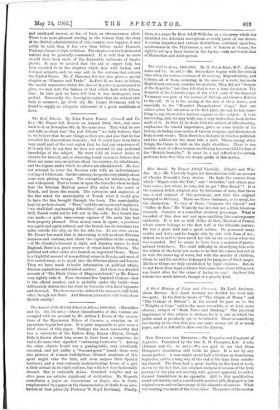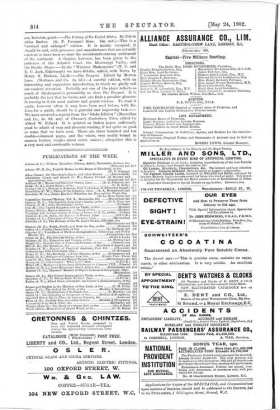NEW EDITIONS AND REPRINTS.—The Tragedies and Fragment of Sophoeles. Translated
by the late E. IL Plumptre, D.D. 2 vols. (Isbister and Co. 5s. net.)---We are glad to see that Dean Plumptre's translation still holds its place. It is not by any means perfect. A man might spend half a lifetime on translating Sophocles, and be a long way at the end of the time from satisfy- ing himself. The Dean had a great facility in this kind of work, shown by the fact that, his original unrhymed version of the lyric portions of the play not meeting with general approval, he added rhymed translations in an appendix. Add to this qualification sound scholarship and a considerable poetical gift, displayed in his original verse, and we have many of the elements of success. What was wanting was more of the limae labor. The inerits of the version are, however, great.—The Pottery of flu, United States. By Edwin Atlee Barber. (G. P. Putnam's Sons. 15s. net.)—'This is a "revised and enlarged" edition. It is mainly occupied, it should be said, with processes and manufactures that are actually existent or have been so since the seventeenth-century settlement of the continent. A chapter, however, has been given to the potteries of the Atlantic Coast, the Mississippi Valley, and the Pacific Slope.—In the "Windsor Shakespeare" (T. C. and E. C. Jack, Edinburgh) we have Othello, edited, with Notes, by Henry N. Hudson, LL.D.—The Tempest. Edited by Morton Luce. (Methuen and Co. 35. 6d.)—A careful edition, with an interesting and suggestive introduction, to which we gladly call our readers' attention. Probably not one of the plays reflects so much of Shakespeare's personality as does The Tempest. It is probably the last that he wrote, and one finds a peculiar pleasure in tracing in it his most mature and genial wisdom. To read it again, however often it may have been read before, with Mr. Lime for a guide, should be a grateful and improving task.— We have received a reprint from the "Globe Edition" (Macmillan and Co., Be. 6d. net) of Chaucer's Canterbury Toles, edited by Alfred W. Pollard. It is printed on Indian paper, sufficiently good to admit of easy and pleasant reading, if not quite as good as some that we have seen. There are three hundred and ten double-columned pages, and the whole, very neatly bound in maroon leather, weighs about seven ounces ; altogether this is a very neat and serviceable volume.







































 Previous page
Previous page